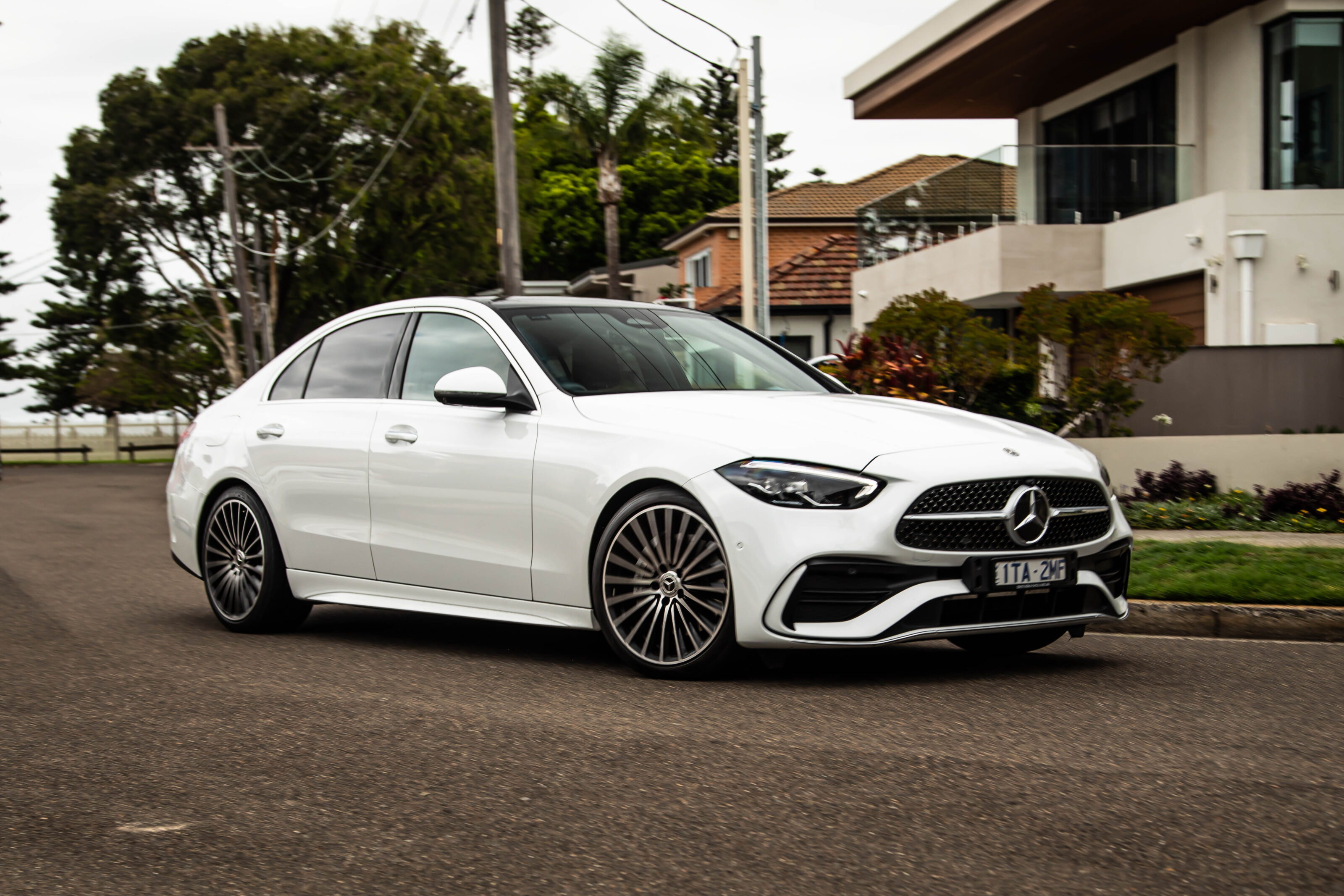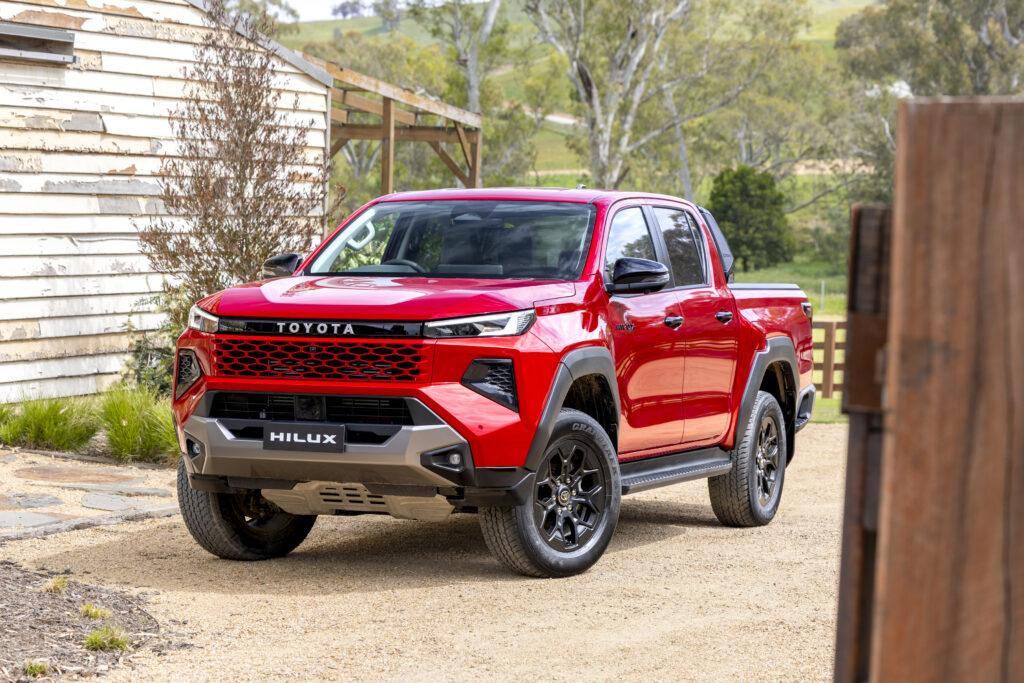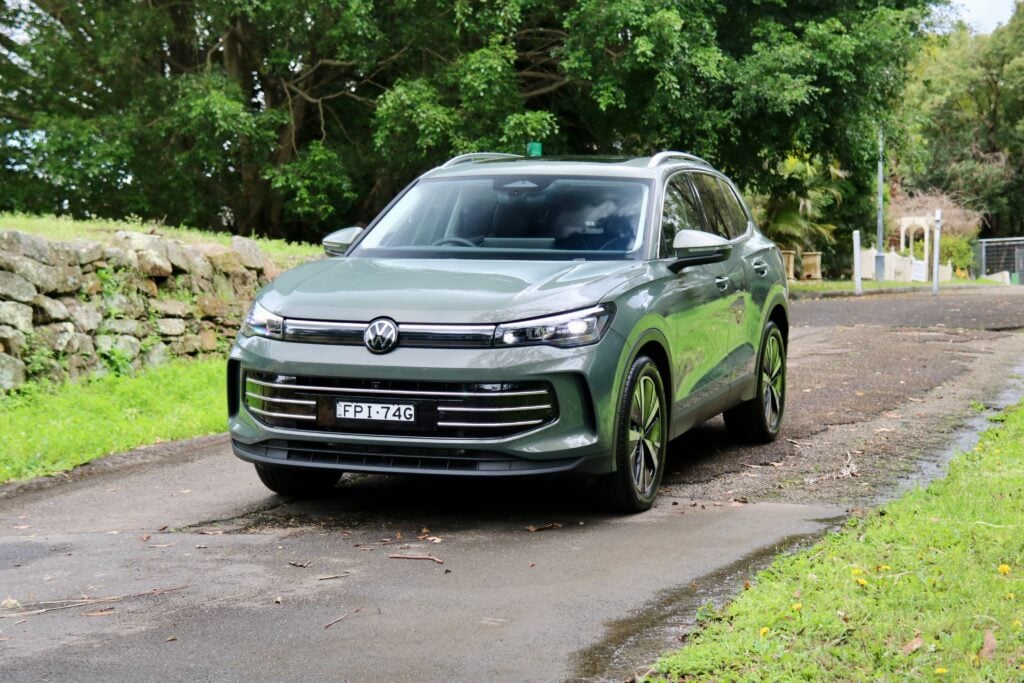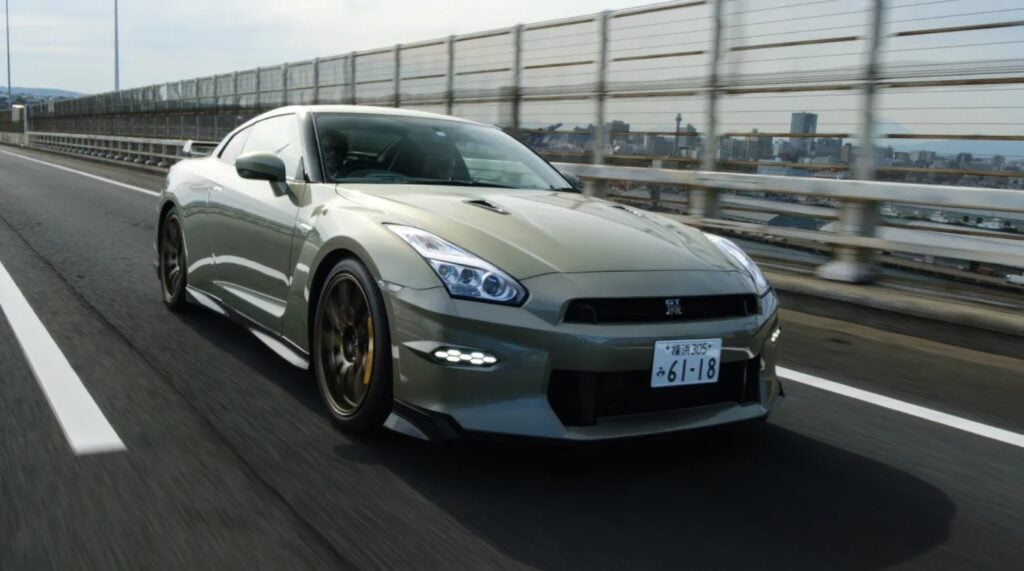Score breakdown
Things we like
- Smooth, almost silent powertrain
- Capable chassis
- Excellent interior
Not so much
- No spare
- Sometimes lumpy ride
- Options pricing
- Brake pedal feel
The C-Class was a standout from the day it first emerged to a buying public not used to a Mercedes-Benz being so small.
It took the engineering excellence of its larger brethren and packed it into the kind of smaller, sporting sedan its German rivals had been pumping out for years.
From four cylinders to eight, there was something for everyone. Talk to some people and they don’t even realise that the C comes in anything other than the delightfully obnoxious range-topping V8 (may it rest in peace).
You can still – thankfully – access this evergreen mid-size sedan despite the dominance of Benz’s SUV range. And you can get it with a 1.5-litre turbocharged four.
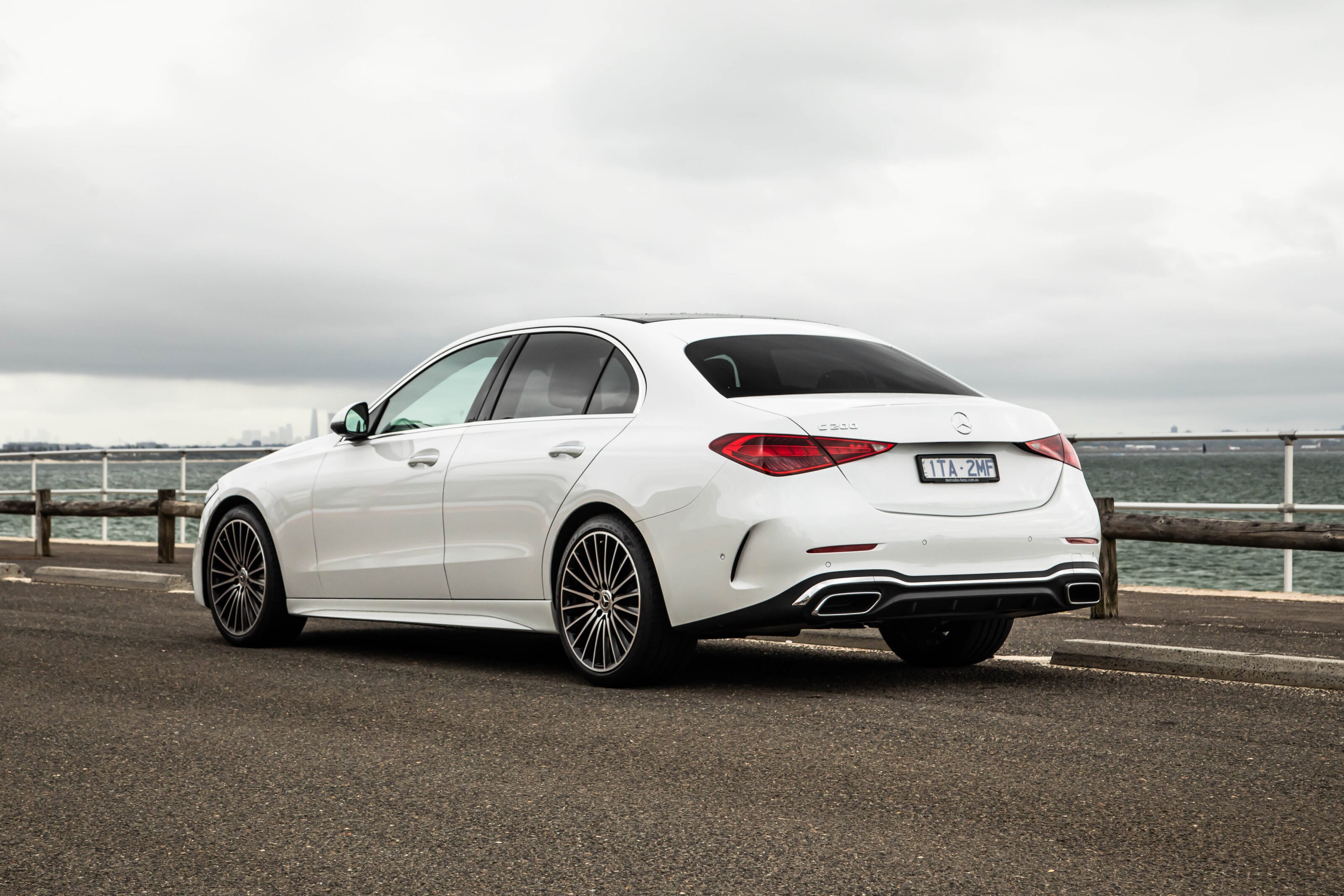
JUMP AHEAD
- How much is it, and what do you get?
- How do rivals compare on value?
- Interior comfort, space and storage
- What is it like to drive?
- How is it on fuel?
- How safe is it?
- Warranty and running costs
- VERDICT
- Specifications
How much is it, and what do you get?
Calling any C-Class sold here an entry-level model is both misleading and curiously unfair – because you can’t get one for less than $78,900 before on-road costs.
That’s a fair chunk of money, but look around the Mercedes range and you’ll find there’s a hatchback for $106,000. So I guess it’s all relative.
A lengthy standard equipment list for the C200 explains what I mean by the misleading idea of it being an entry-level car.
| Mercedes-Benz C200 standard features | |
|---|---|
| 11.9-inch touchscreen | Heated, electric-folding door mirrors |
| 18-inch alloy wheels | Keyless entry and start |
| 360-degree cameras | LED taillights |
| 5-speaker stereo | Nappa leather steering wheel |
| Adaptive cruise control | Power front-seat adjustment |
| Auto LED headlights | Reversing camera |
| Auto wipers | Runflat tyres |
| Digital dashboard | Satellite navigation |
| Dual-zone climate control | Synthetic leather upholstery |
| Electronic dampers | Wireless Android Auto |
| Front and rear parking sensors | Wireless CarPlay |
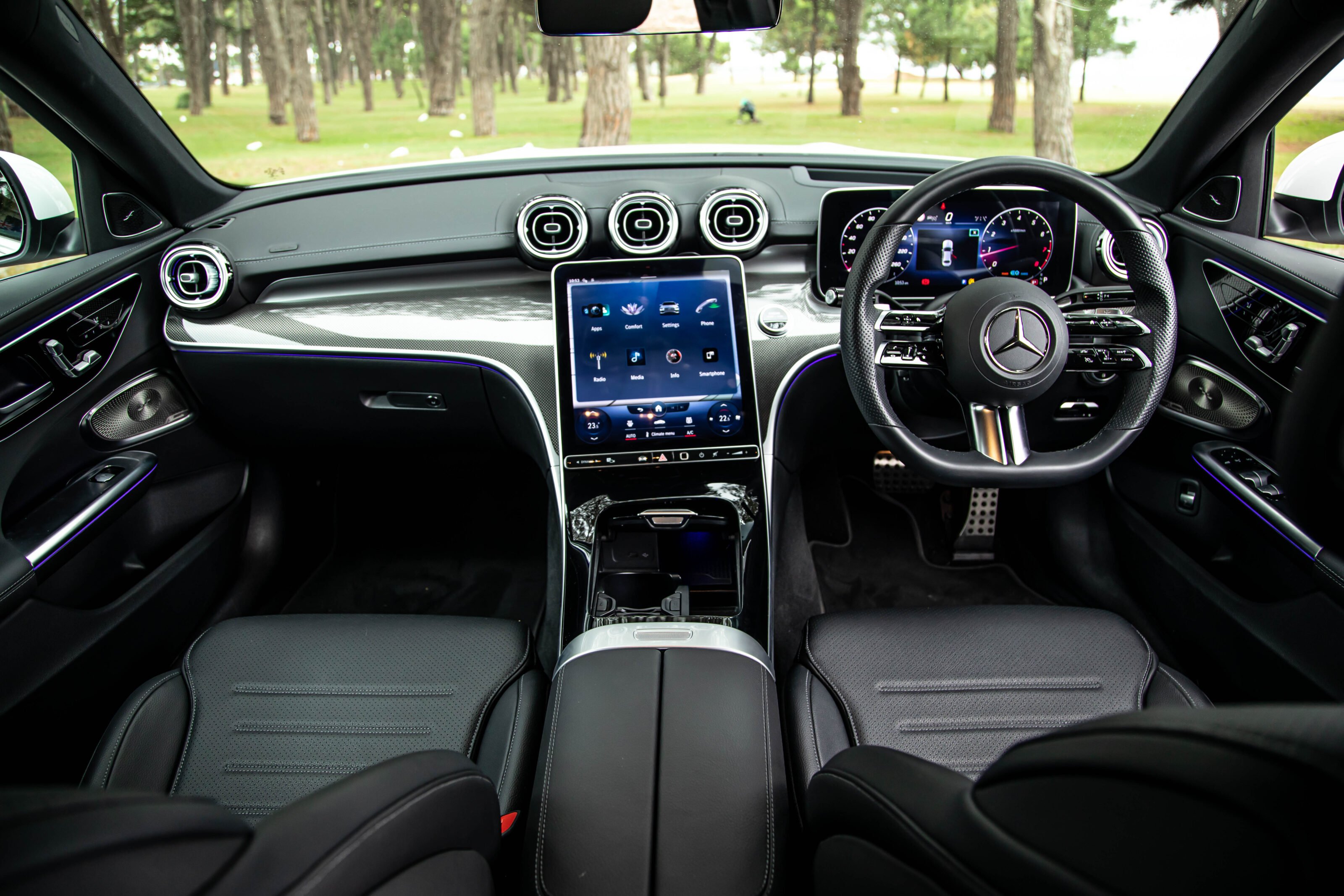
The AMG Line exterior styling package comes standard on Australian market cars, which mirrors the M Sport-rich BMW 3 Series range and packs some sporty styling additions.
Our test car had 19-inch alloys as part of the $1307 Sport Package, Opalite White paint ($2384), the $3154 Vision Package (huge sunroof, head-up display, augmented reality for the sat-nav and heated front seats with memory) plus the Burmester 3D sound system for $1614. Add to that another $733 in luxury car tax and this car was $88,093 before on-road costs.
The head-up display is a widescreen masterpiece that can be filled with lots of useful information, including detailed navigation directions.
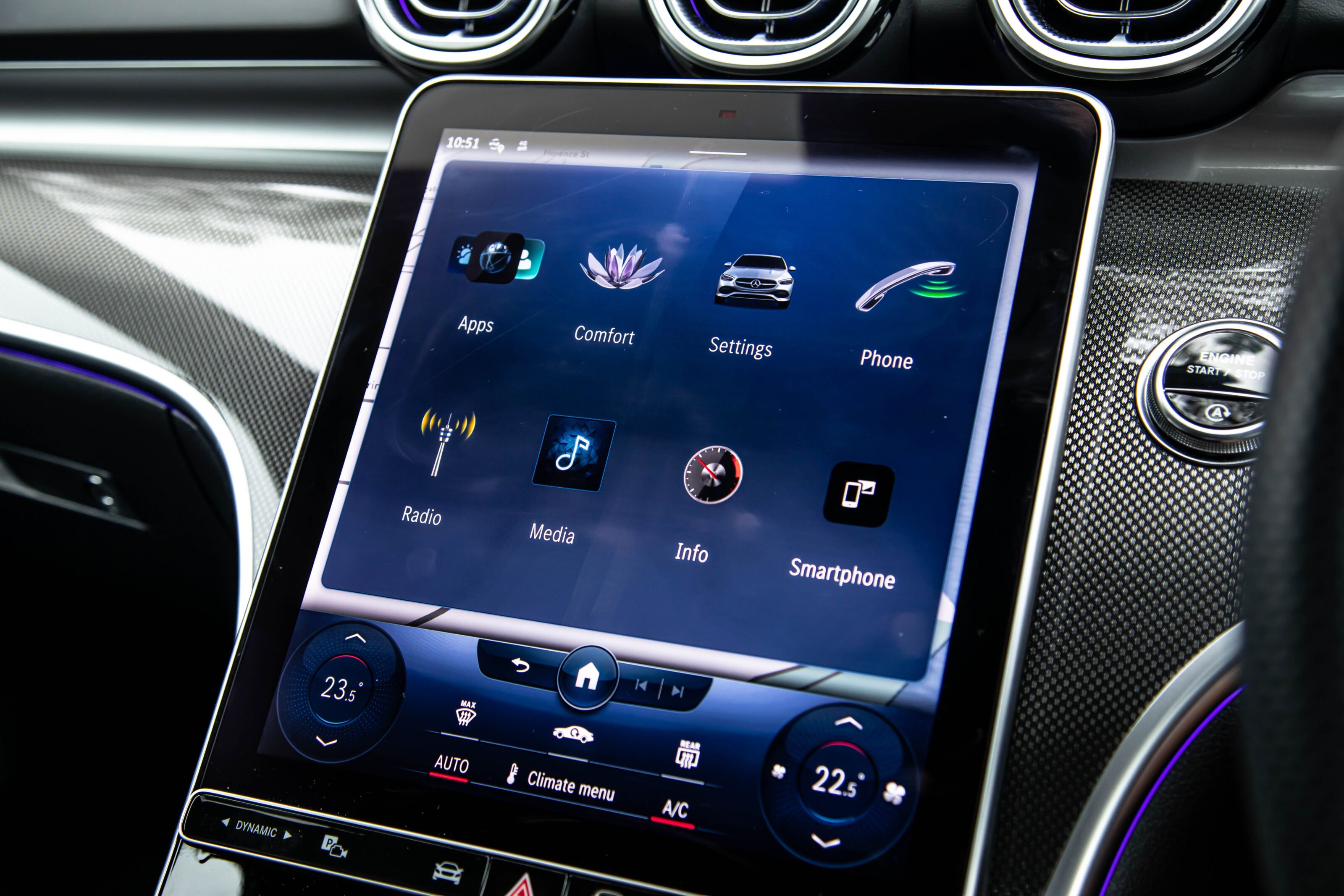
How do rivals compare on value?
The first and most obvious rival is the BMW 320i. A cracker of a car in its G20 generation, it was a return to form after a slightly off previous version.
For a not entirely dissimilar – okay, an identical – $78,900 before on-road costs, the 320i ships with a larger 2.0-litre four-cylinder turbo-petrol engine, offering the same torque but less power. It does have the always lovely eight-speed ZF automatic transmission and a slightly more focused chassis if you’re a keen driver.
Bucking the pricing and configuration trend, the front-wheel drive Audi A4 35 TSI comes in at $66,300 before on-road costs while normal German transmission resumes with the all-wheel drive 45 TSI Quattro arriving at $75,700 before on-road costs, still cheaper than either the Merc or BMW.
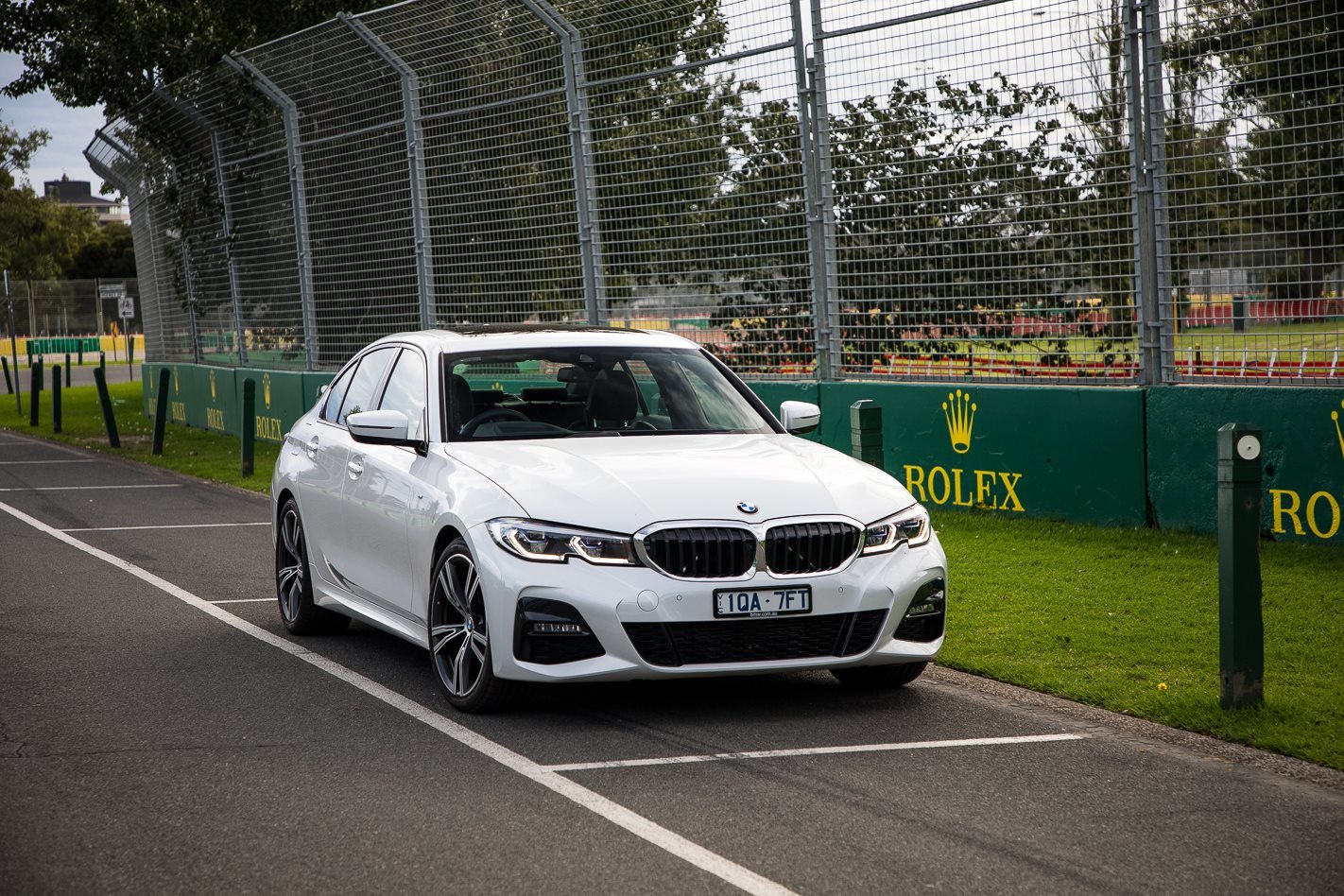
The 2.0-litre turbo petrol mirrors that of the BMW and, in the 45, has a comparatively whopping 183kW. The 35 makes do with 110kW, so you can see why it’s much cheaper. It’s also not as lavishly equipped as the 45. Added to that, this generation of A4 is older than either of the other Germans.
If you want to head off east, the Genesis G70 kicks off at $63,000 before on-road costs, thoroughly baiting you with a much lower price. It’s a very nice car with a 2.0-litre turbo-petrol driving the rear wheels. Spend C-Class money and the 3.3-litre twin-turbo V6 will fire you down the road more vividly than almost anything at this price point in the luxury domain.
Sadly, the Lexus IS currently off the menu for safety reasons.
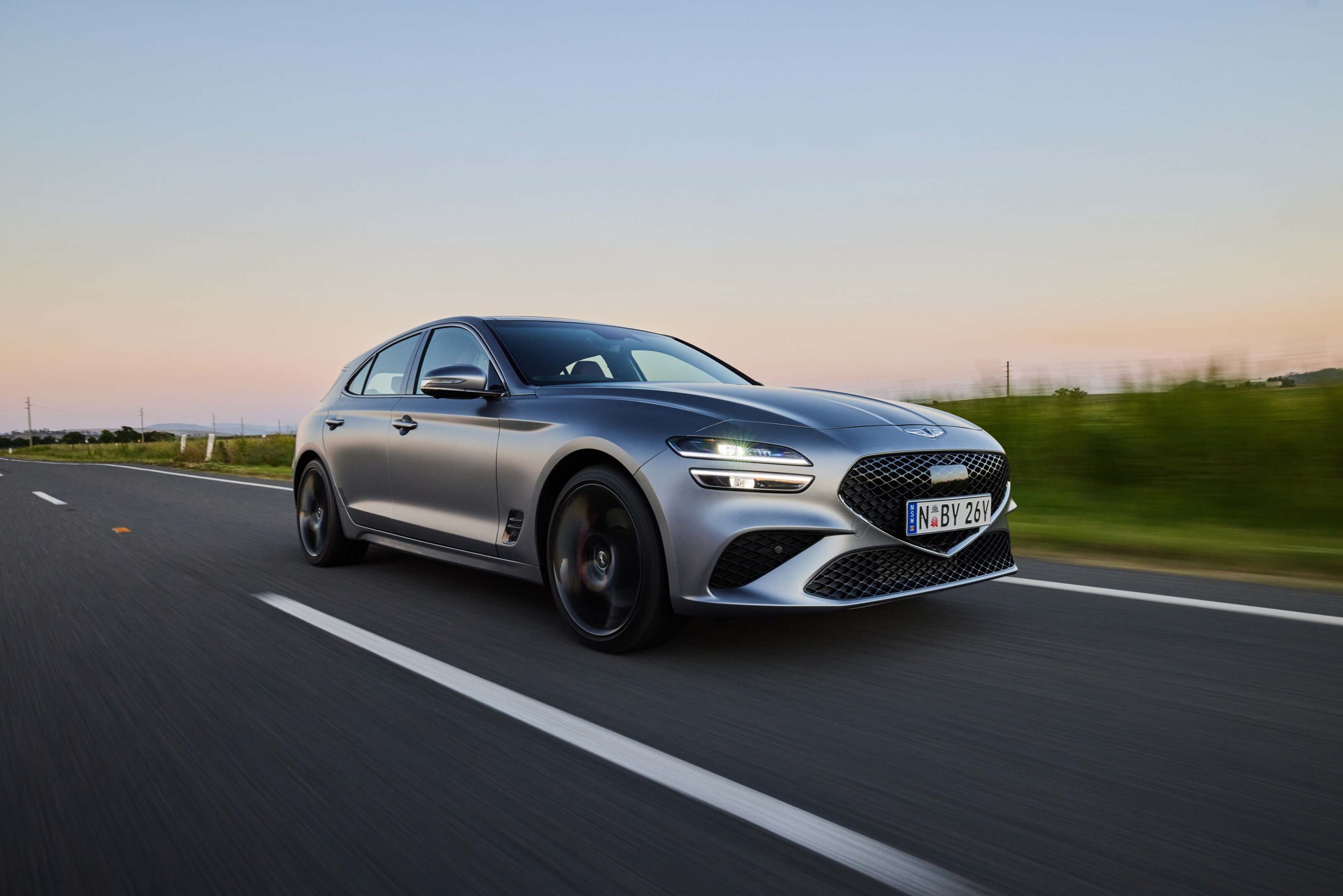
Interior comfort, space and storage
The previous C-Class – known as W205 – was a nice car but not great for rear-seat occupants. One of the changes for this car, the W206, is a small but effective 25mm increase in wheelbase.
Although that doesn’t sound like much, for 180cm tall me it is the difference between sitting behind my driving position with knees brushing the front seat to them…er…not. While we’re here, let’s start with the back seat.
Both outboard seats are well-shaped and a nice place to park your backside. The sculpting puts your backside a bit lower to maximise headroom but there’s plenty of under-thigh support. You get more shoulder room in the newer car, too, thanks to its wider body. Headroom isn’t wildly expansive, especially with the huge sunroof, but it’ll be fine if you’re under 185cm.
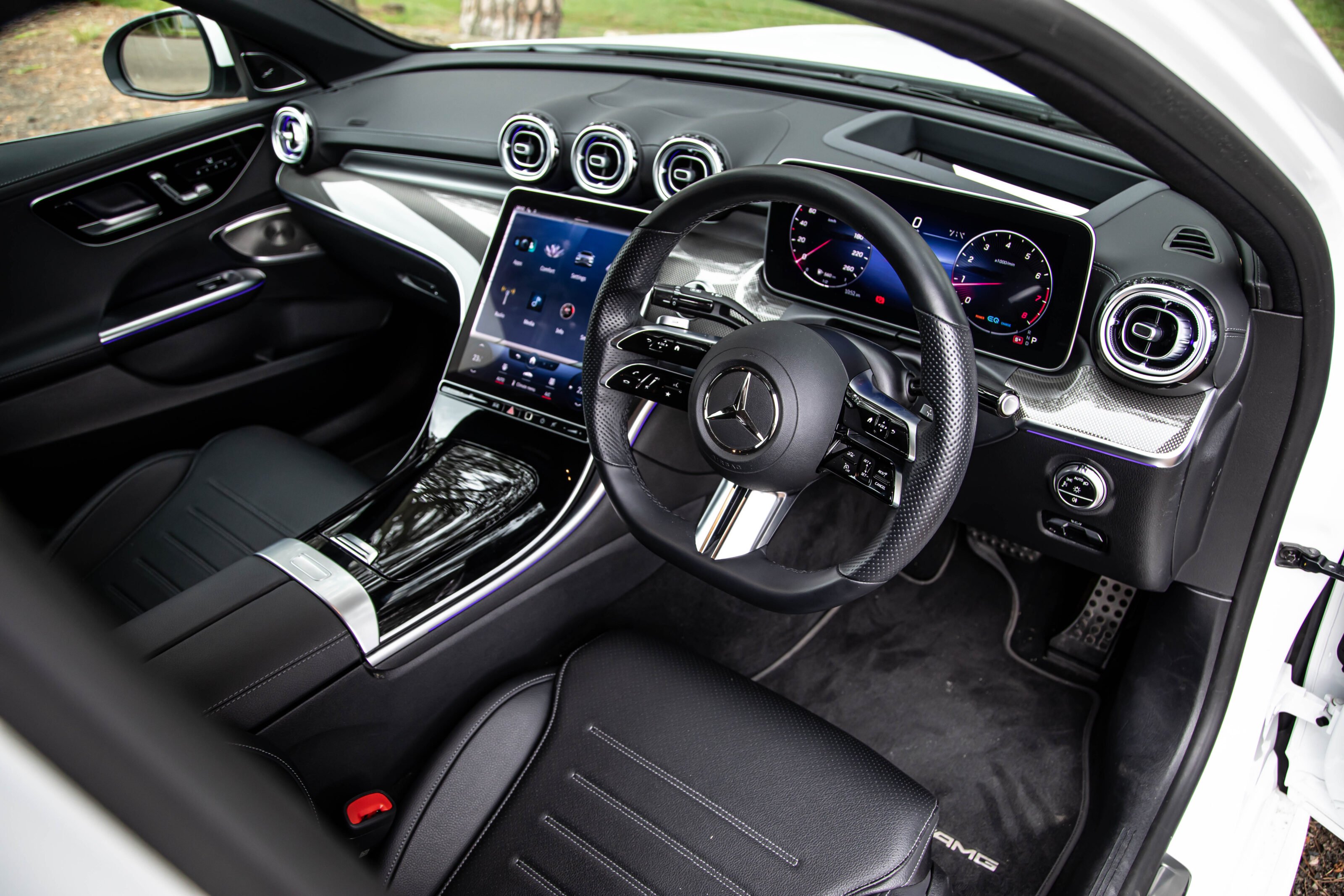
The middle seat isn’t great and exists mostly as a space for the armrest that houses a pair of cup holders. There are vents back here, which is handy too.
Up front, you get a properly handsy pair of sports seats. You sink back into them, with a lot of lateral support for your ribcage. The thick-gauge steering wheel felt a bit chunky at first but I grew to like it.
Two big screens dominate the front of the cabin. Unlike the A- and E-Class, the MBUX setup here is a little more traditional in the sense you don’t get a sweep of two identically-sized screens. The 12.3-inch dash screen is vintage Mercedes; clear, crisp and great in all lighting conditions.
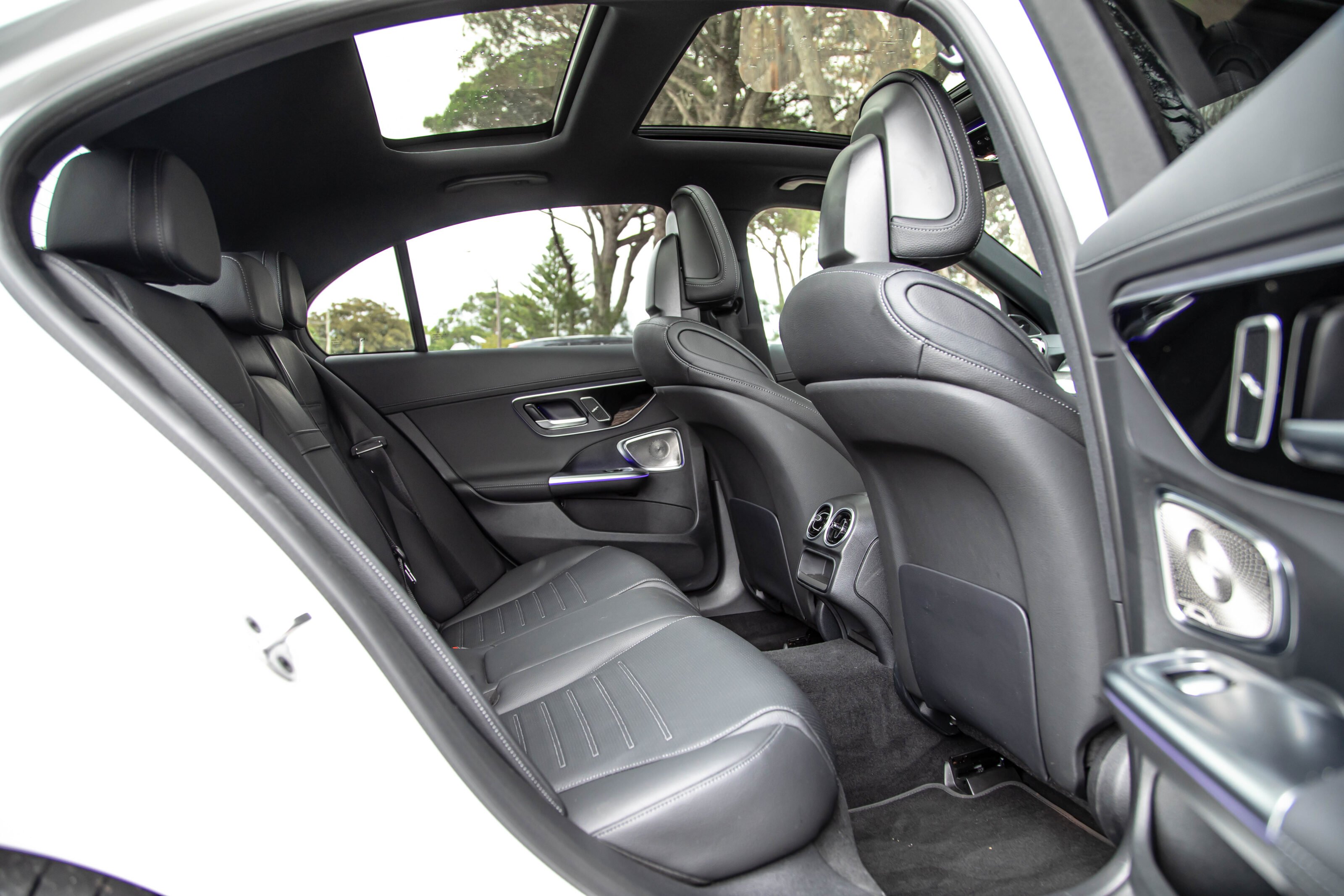
An 11.9-inch central touchscreen ditches conventional wisdom and is neither portrait nor landscape, instead going with a square shape. It works remarkably well with Apple CarPlay and it’s a beautiful piece of hardware.
Under your elbows is an uncluttered console with two cup holders and a wireless charging pad. The overall impression is tech-heavy and at night with the selectable LED lighting, it really looks the business.
It all goes a long way toward outweighing some of the flimsier plastics around the cabin. Similarly weird and insubstantial feeling is the strip of plastic that takes on various functions including the volume controls. I wasn’t convinced.
The boot measures 455 litres, breaking with a long-standing tradition of matching both the Audi A4 and BMW 3er’s suspiciously identical 480 litres.
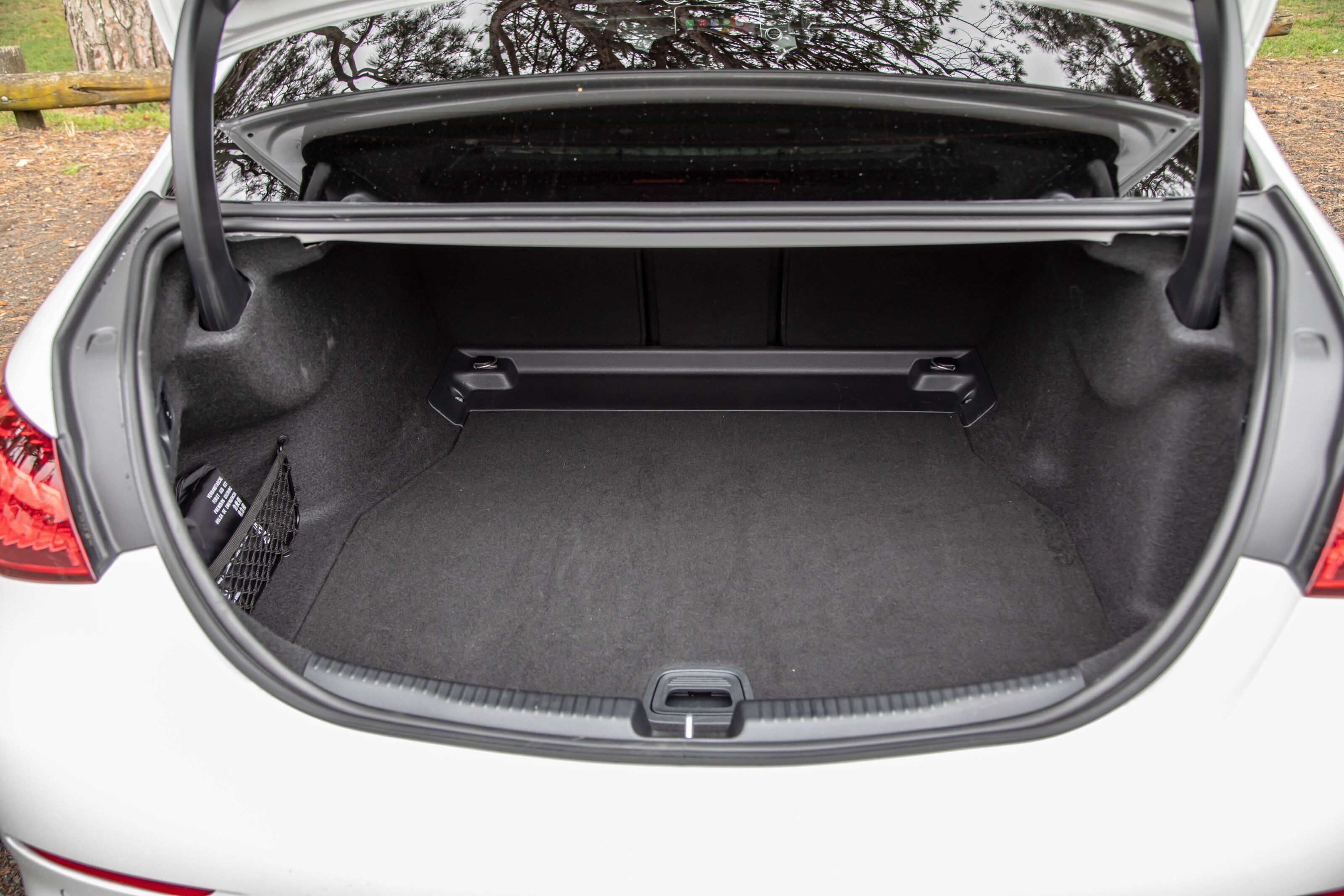
What is it like to drive?
The weirdest thing about the C200 is that it doesn’t feel warm-hatch quick.
Although that seems like an odd thing to lead out with, I was convinced it was slow, like 10 seconds to 100km/h slow. But that’s not true, because it completes that sprint in a not-at-all-tardy 7.3 seconds.
| Mercedes-Benz C200 drivetrain | |
|---|---|
| Engine | 1.5-litre four-cylinder mild hybrid turbo-petrol |
| Transmission | 9-speed automatic |
| Power | 150kW @ 5800-6100rpm |
| Torque | 300Nm @ 1800-4000rpm |
A small engine in this type of car would have been unheard of not so long ago. Two-plus litre engines at least, six cylinders preferably. This one is mighty impressive. Virtually silent, it cheerfully spins up the rev range toward its 150kW power peak, but you don’t really need to push it. Its refinement is what fooled me.
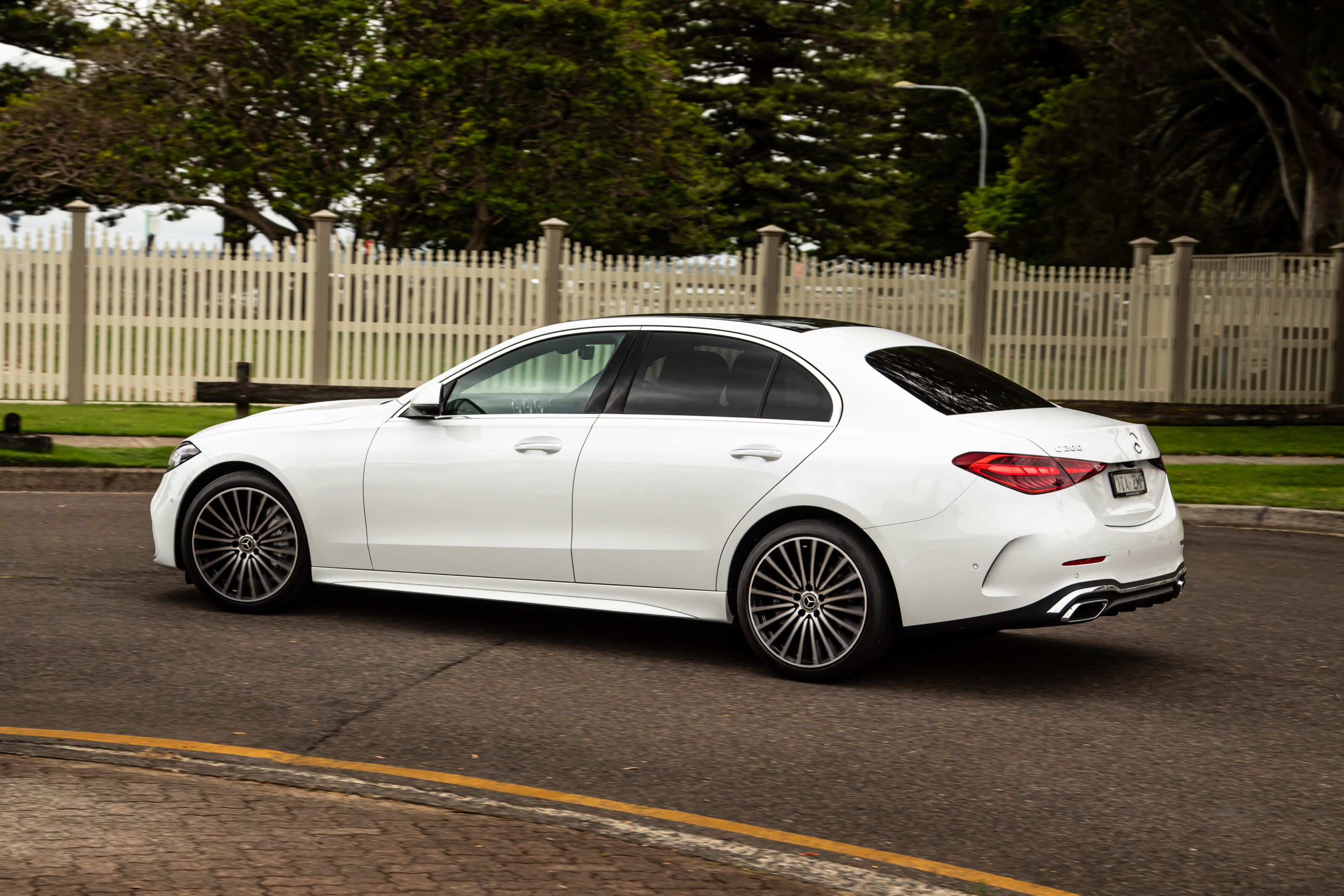
The full 300Nm arrives pretty early on and sticks with you as you work your way through the gears. The 48-volt mild hybrid system also adds a little kick of torque here and there for even more smoothness. In the W206 the belt-driven system has been replaced with an integrated electric motor.
Even on startup, it delivers something new – press the button and the engine goes from being off to on. No shake, shimmy or the familiar sounds of a starter motor. It’s almost like a racing engine in its immediacy.
The same goes for the stop-start system, which is operated by the same mechanism. It might seem silly to go on about it, but it’s nice to see that even as we enter the last decade of widespread internal combustion, engineers are still putting their minds to improving the breed.
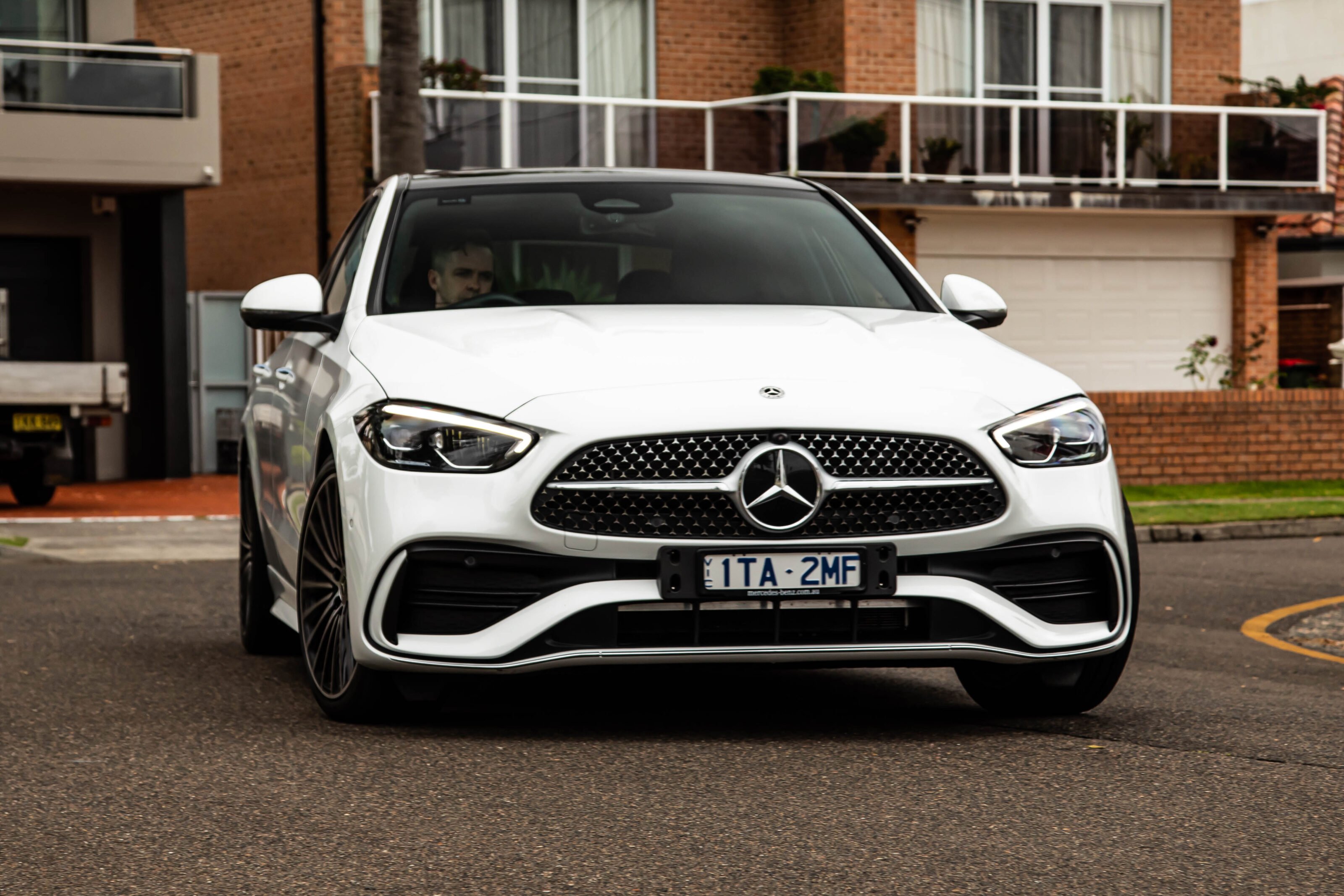
Underway, the 19-inch wheels seem to spoil the party sometimes. Despite having adaptive dampers, the C200’s ride can get a little lumpy and unsettled over poor surfaces but somehow manages to erase all but the biggest bumps. Most of the time, however, it’s taut but composed, the way a sporting sedan should be.
It would be interesting to drive it on 18s to see if a bit of extra rubber in the sidewall irons things out. It is, however, a huge improvement on the older car which wasn’t known for supple springs and dampers.
The real drag, though, is the brake pedal. At the top of its travel, it feels very vague and longer than I would like. You need to go a bit further than most cars before the pads start to bite and you get the braking force you’d expect. It’s not terrible and you’ll get used to it as I did, but modulation in slow traffic could be better. You’ll be quite reassured by their power in a big stop though.
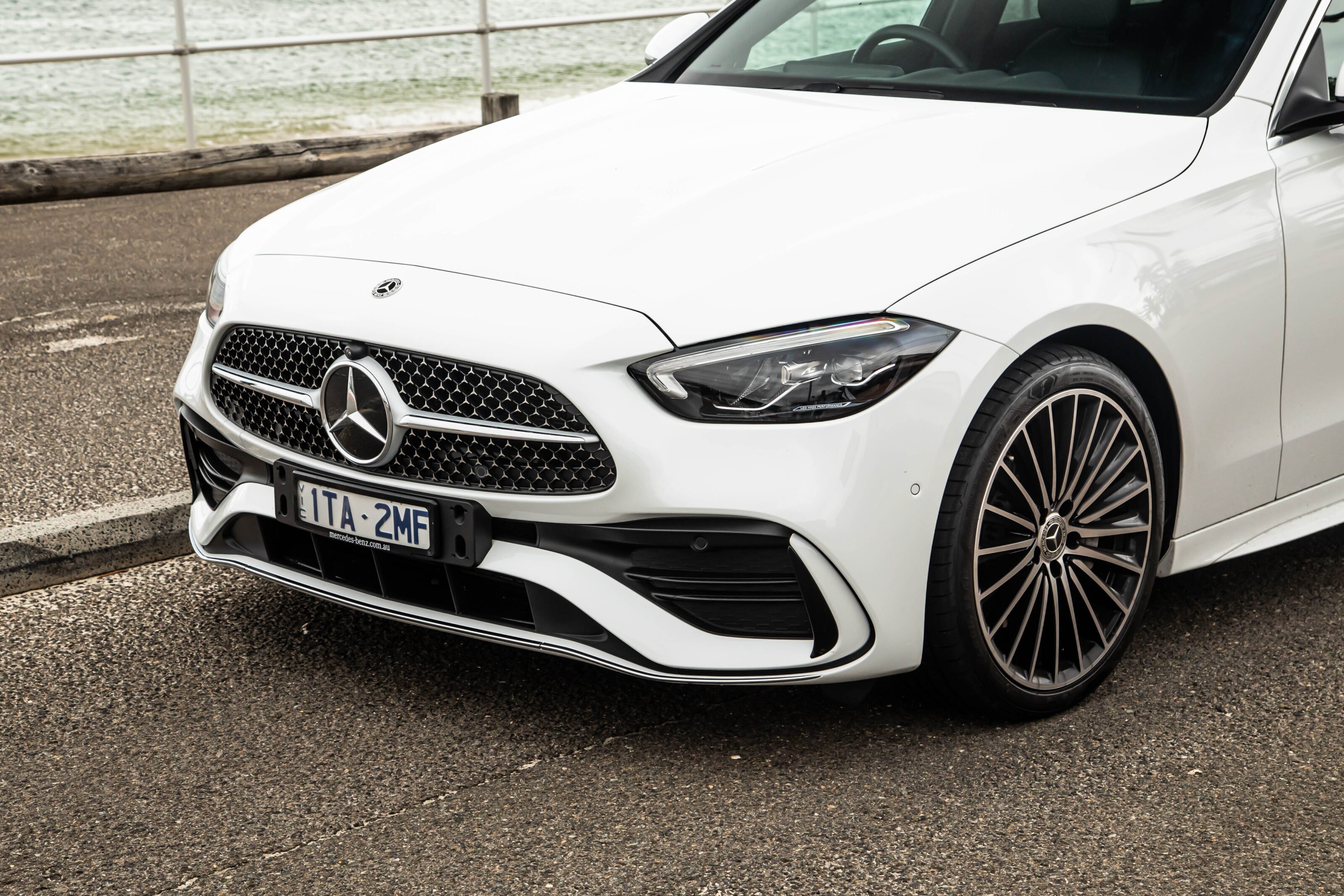
How is it on fuel?
Mercedes claims 6.9L/100km from the mild-hybrid C200, which of course runs on premium unleaded.
| Fuel economy (claimed) | 6.9L/100km |
| Fuel economy (trip computer) | 7.4L/100km |
| Fuel type | 95 RON |
| Fuel tank capacity | 66 litres |
My week delivered a result of 7.4L/100km. This included a lot of bombing around the suburbs and a long, blessedly uninterrupted run from my home in Sydney to Katoomba and back.
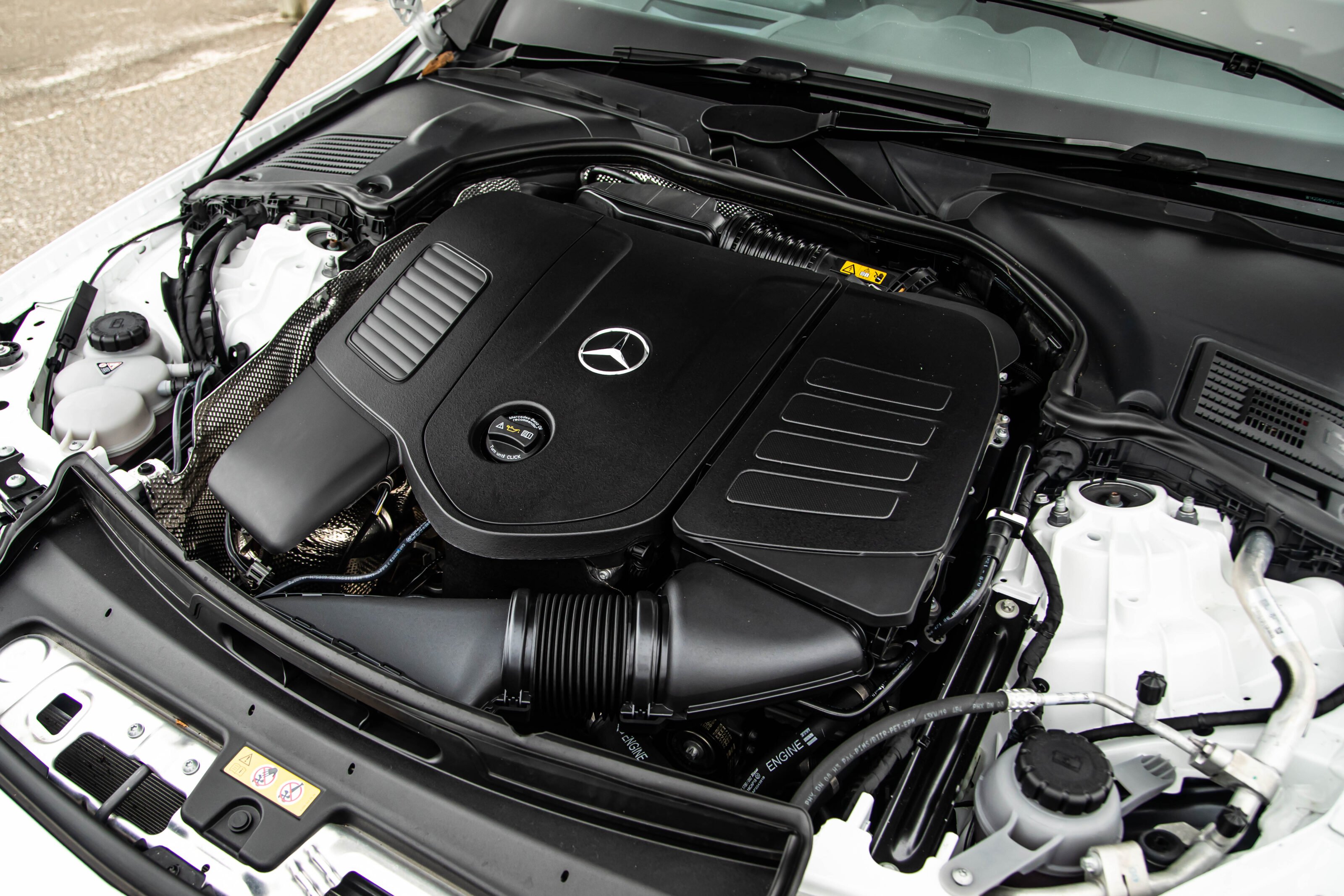
How safe is it?
The W206 C-Class is packed with safety gear, scoring five ANCAP stars in 2022.
| 10 airbags | Lane departure warning |
| 360-degree cameras | Lane-keep assist |
| ABS | Rear cross-traffic alert |
| Blind-spot monitoring | Reverse AEB |
| Driver fatigue warning | Reversing camera |
| Forward auto emergency braking with pedestrian detection | Rollover stability |
| Forward collision warning | Stability and traction controls |
The forward AEB works at high and low speeds and features pedestrian detection. The huge airbag count includes a driver’s knee airbag and the front centre airbag designed to prevent head clashes in a side impact, which explains its box-fresh five-star ANCAP rating.
For the kiddies, there are also two sets of ISOFIX points and three top-tether anchors.
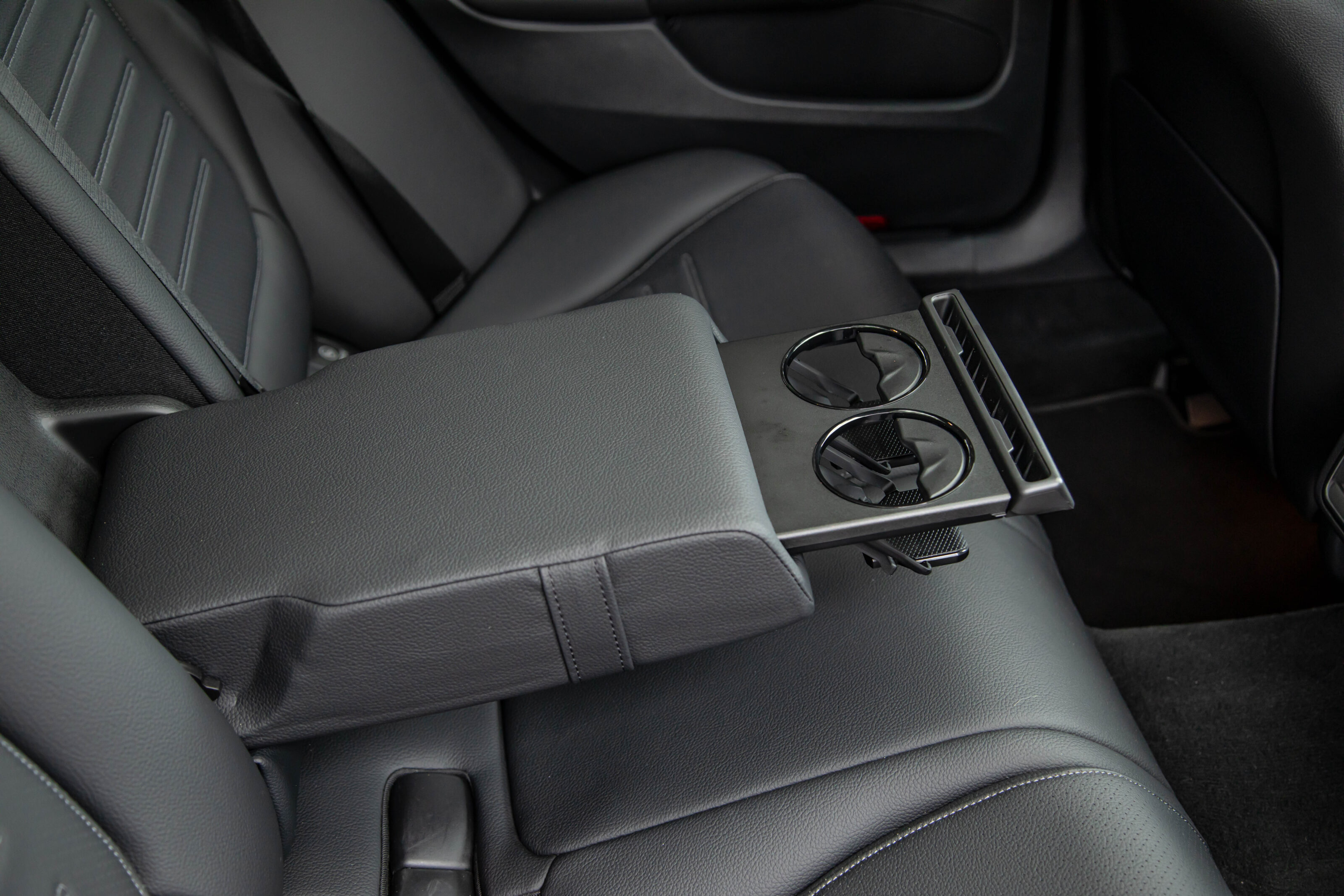
Warranty and running costs
Mercedes-Benz offers a five-year, unlimited-kilometre warranty and the choice of capped-price servicing or pre-paid maintenance plans.
The latter covers all services that fall in a three, four or five-year timeframe depending on the plan you choose, with intervals arriving at a generous 12 months or 25,000km.
In a world of skyrocketing prices, it’s unusual to see that the plans for the W206 are cheaper than they were for the W205. A three-year plan costs a still-substantial $2650, four is $3600 and five is $5200.
It’s cheaper by about $100 a year than the older car, so that’s nice.
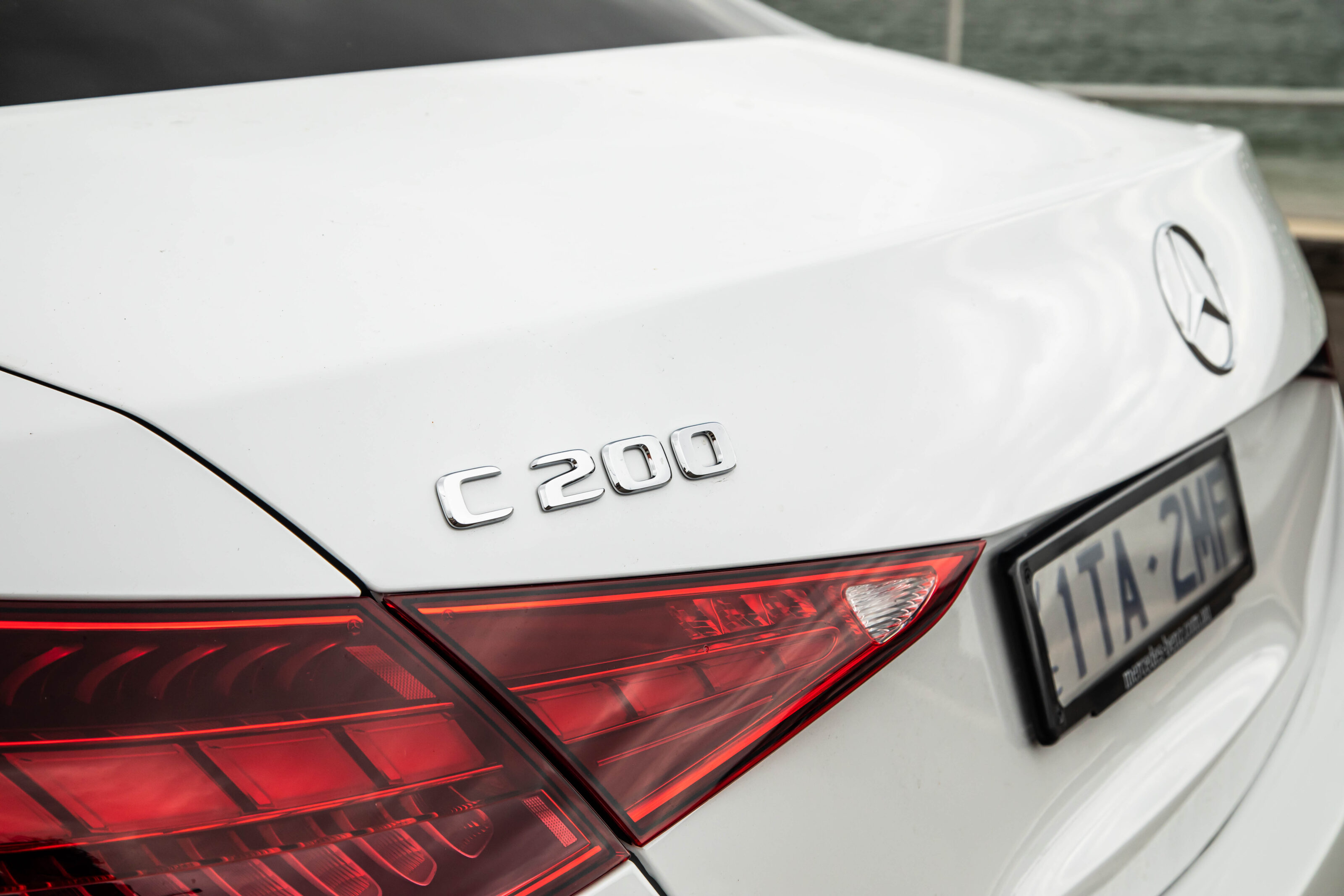
VERDICT
The C200 is an astonishingly refined car. You might expect that for the money, but even so, the execution is mightily impressive.
Quiet, and composed but swift enough for most tastes, it’s not a half-hearted effort as Benz coasts to the finishing line for combustion-engined cars.
While the price of entry is high, you’re getting a tech-laden machine with an excellent safety package, low running costs (servicing excepted) and in this W206 generation, it’s sharply styled.
Sporting sedans are thin on the ground but boy howdy am I pleased they’re not only still around, but this good. The next A4 and 3 Series have their work cut out.
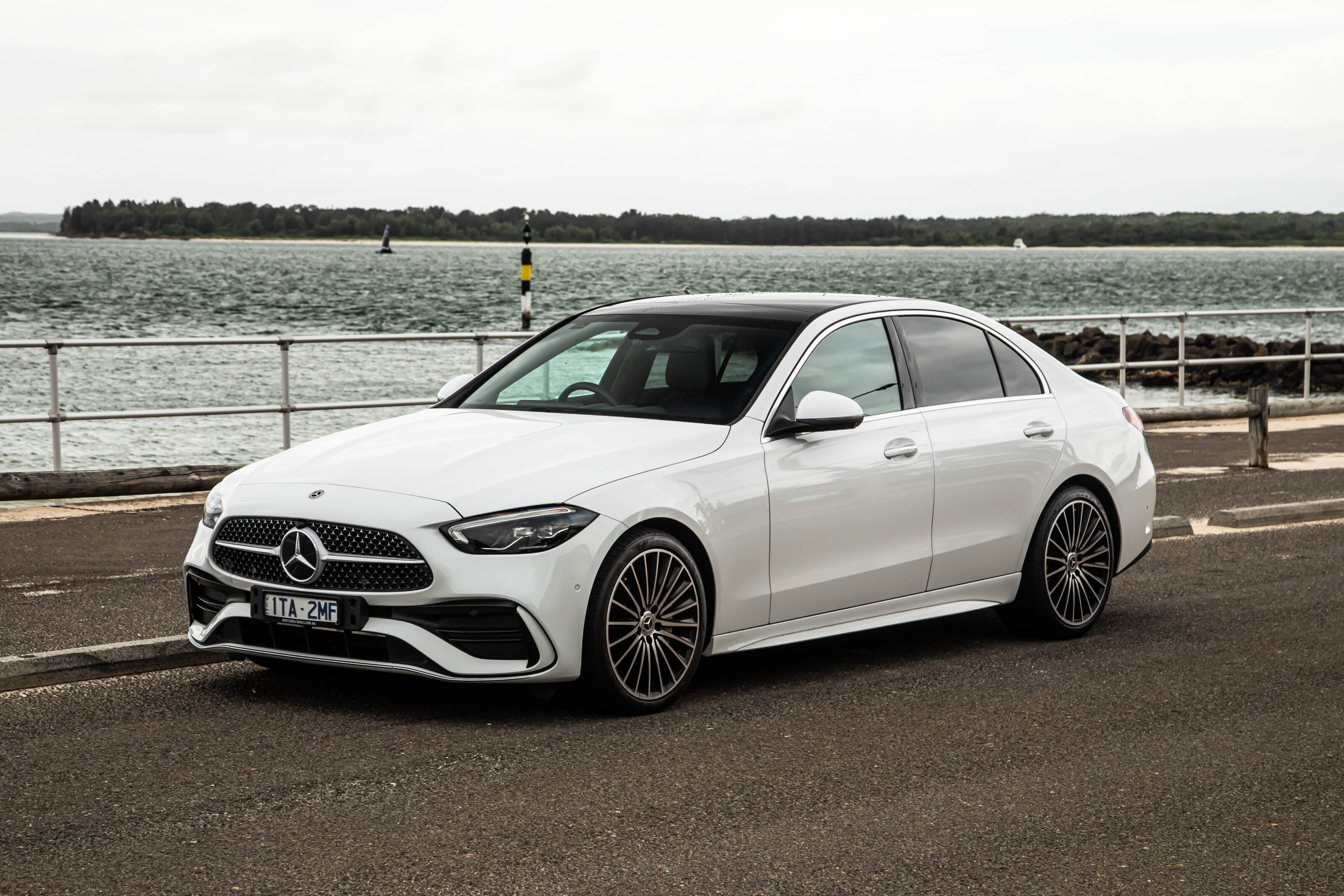
| Mercedes-Benz C200 sedan specifications | |
|---|---|
| Body | 5-door, 5-sear medium sedan |
| Drive | rear-wheel |
| Engine | 1.5-litre four-cylinder mild hybrid turbo-petrol |
| Transmission | 9-speed automatic |
| Power | 150kW @ 5800-6100rpm |
| Torque | 300Nm @ 1800-4000rpm |
| Bore stroke (mm) | 78 x 78.3 |
| Compression ratio | 10.5 : 1.0 |
| 0-100km/h | 7.3 sec (claimed) |
| Fuel consumption | 6.9L/100km (ADR combined) |
| Weight | 1575kg |
| Suspension | MacPherson struts front/multi-link rear |
| L/W/H | 4793mm/1820mm/1446mm |
| Wheelbase | 2865mm |
| Brakes | ventilated disc front / solid disc rear |
| Tyres | 225/40 R19 front / 255/35 R19 rear |
| Wheels | 19-inch alloy (no spare) |
| Price | $78,900 + on-road costs |
Score breakdown
Things we like
- Smooth, almost silent powertrain
- Capable chassis
- Excellent interior
Not so much
- No spare
- Sometimes lumpy ride
- Options pricing
- Brake pedal feel
We recommend
-
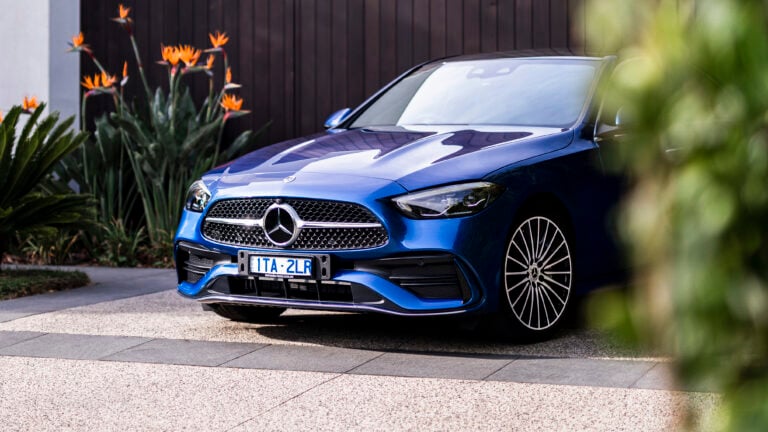 News
News2022 Mercedes-Benz C-Class price and features: $78,900 starting point
The fifth-generation C-Class is set to break new ground for Mercedes’ most popular model
-
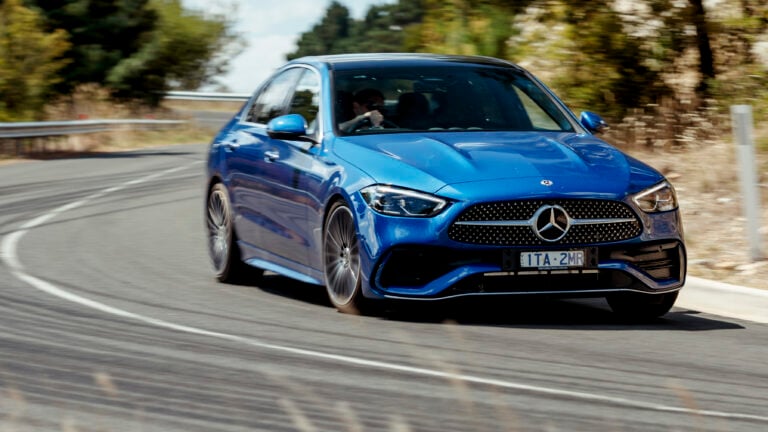 Reviews
Reviews2022 Mercedes-Benz C200 review
A gifted base car that has us questioning if you really need a C300…
-
 News
NewsNew car calendar 2026: All the new cars coming to Australia next year
Here’s the WhichCar by Wheels guide to all the new cars that will launch in Australia in 2026. Check back in regularly for updates...


